Unit 3 Could you please tell me where the restrooms are? Section B(2a-2c) 精品课课件+嵌入音视频(共49张PPT)
文档属性
| 名称 | Unit 3 Could you please tell me where the restrooms are? Section B(2a-2c) 精品课课件+嵌入音视频(共49张PPT) |
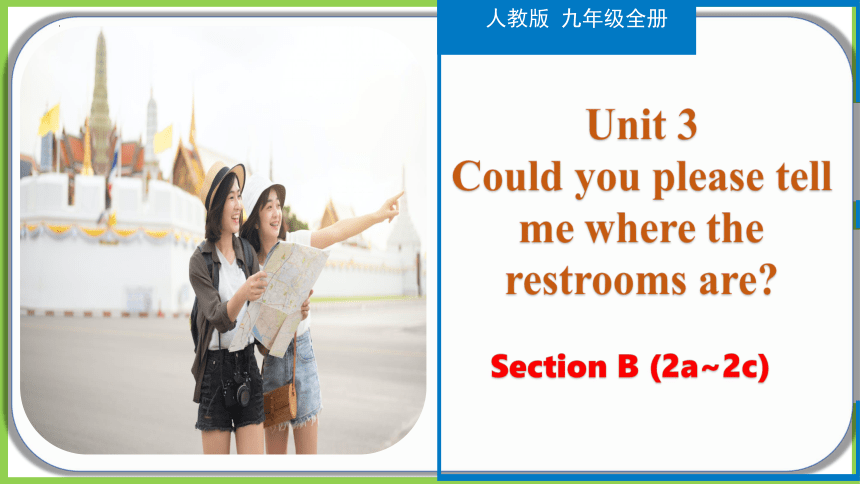
|
|
| 格式 | zip | ||
| 文件大小 | 11.4MB | ||
| 资源类型 | 教案 | ||
| 版本资源 | 人教新目标(Go for it)版 | ||
| 科目 | 英语 | ||
| 更新时间 | 2022-09-24 00:00:00 | ||
图片预览

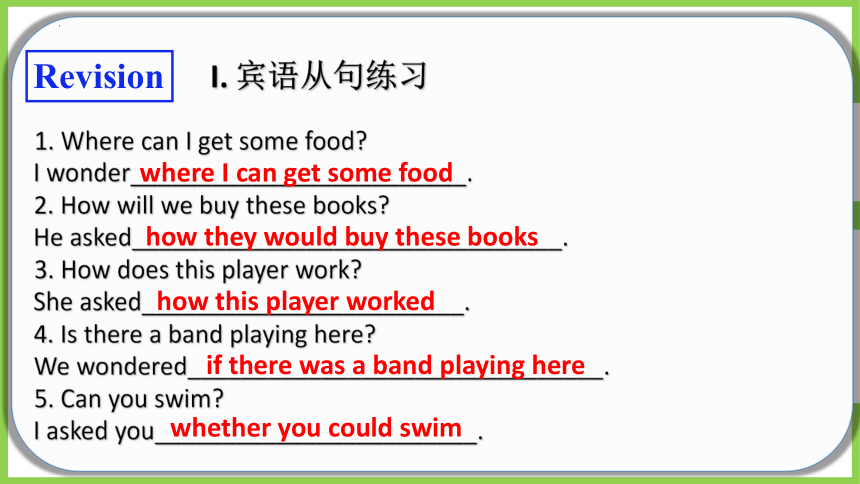
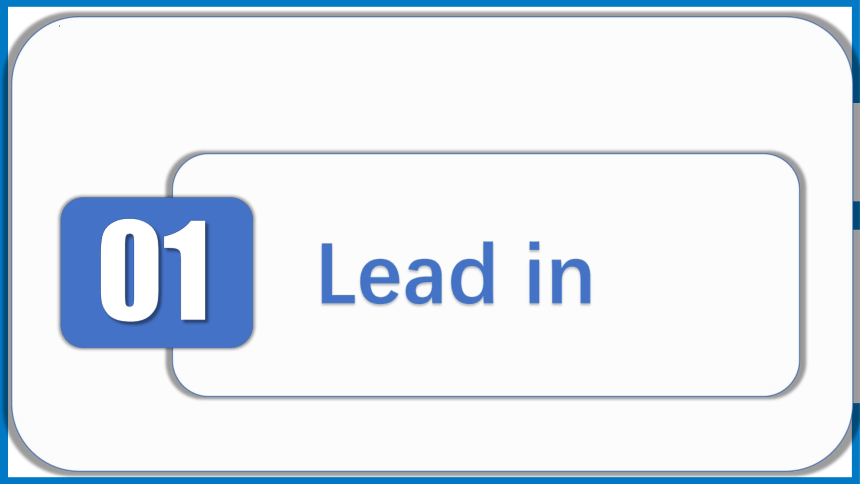
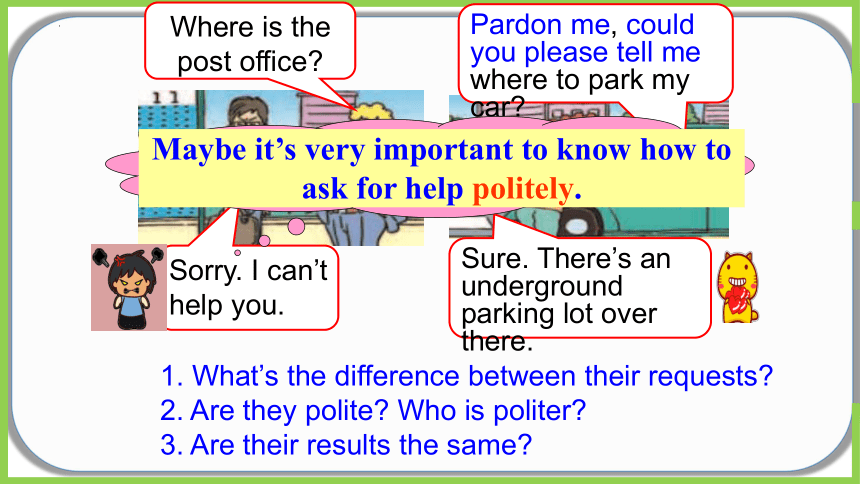
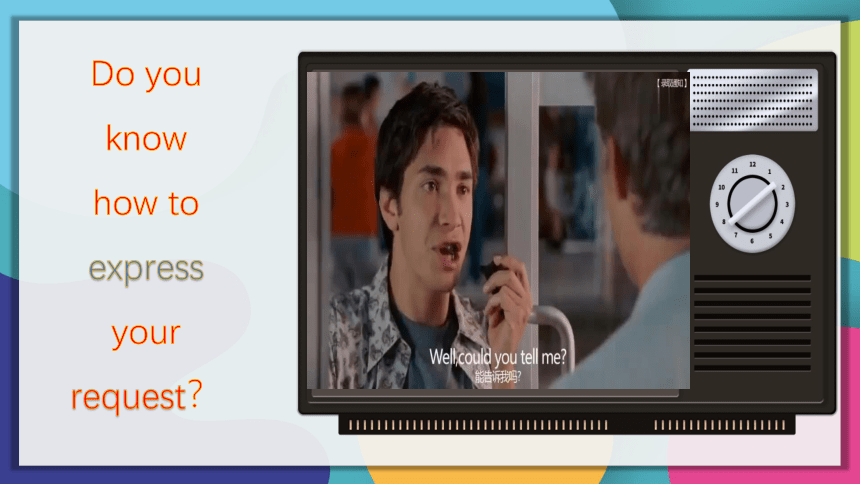
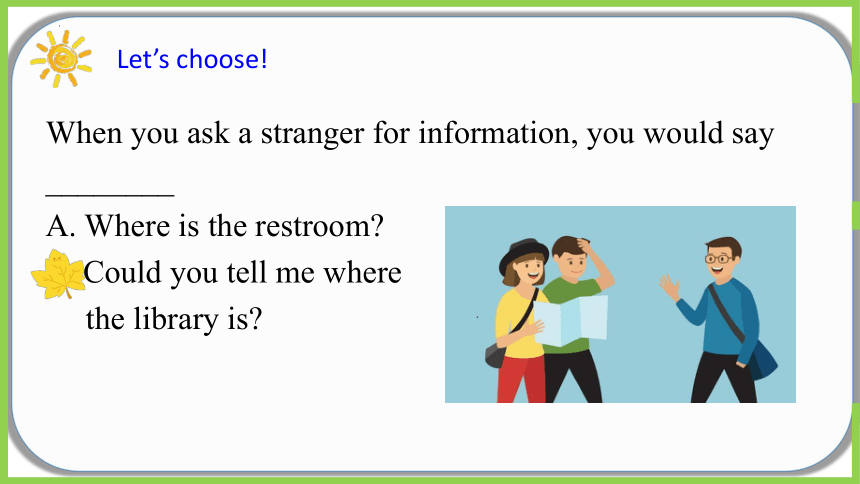
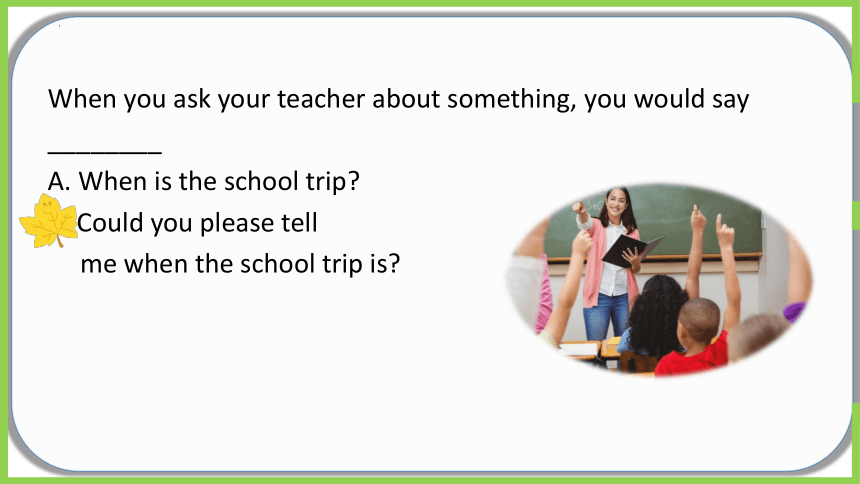
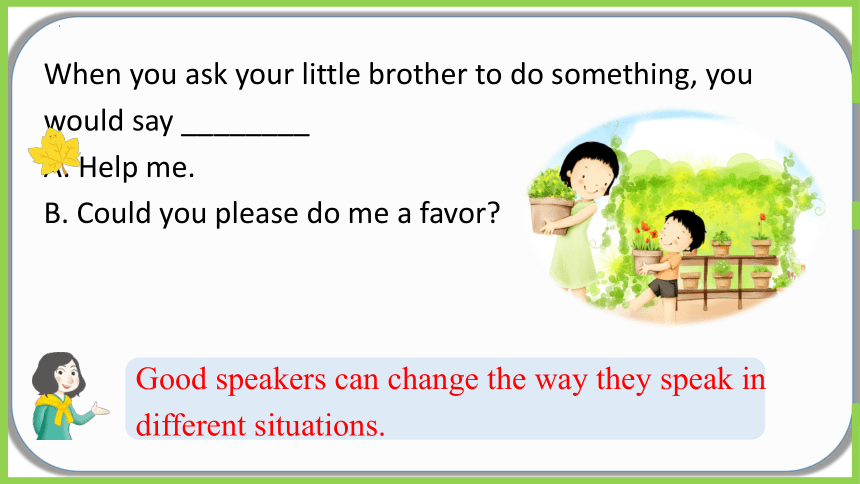
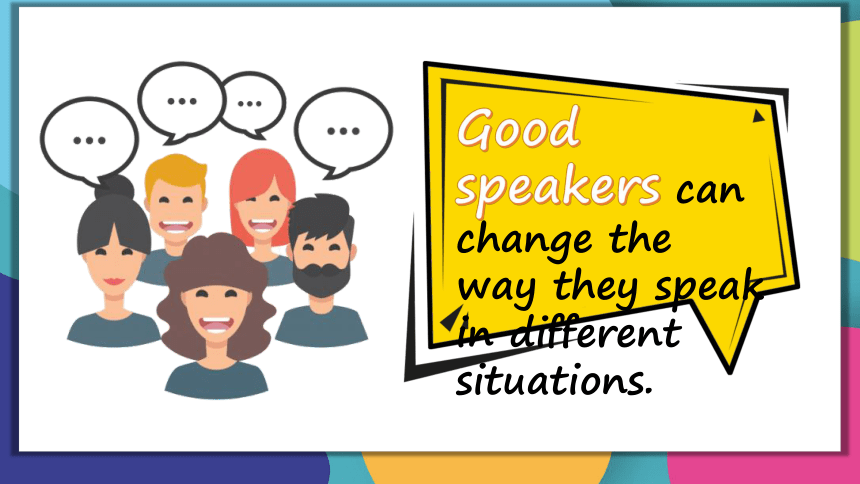
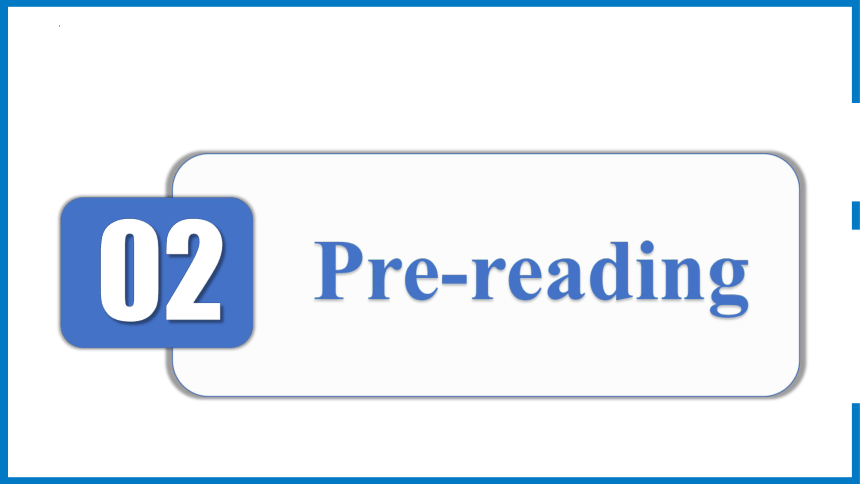

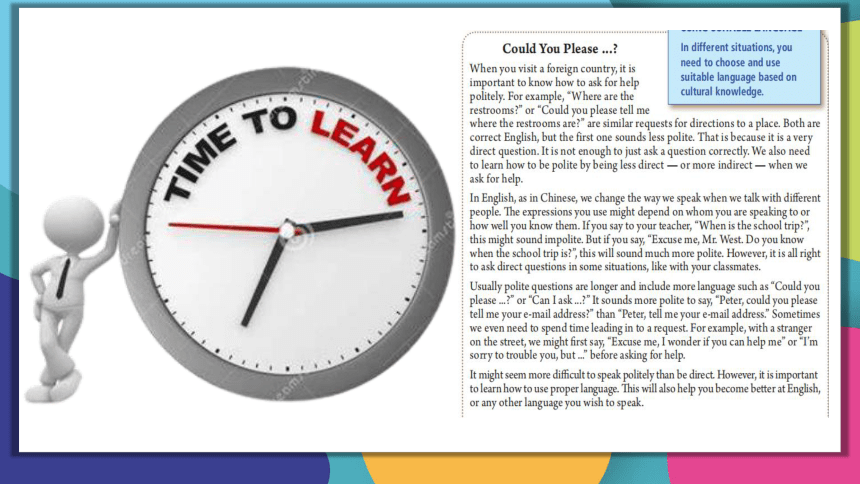
文档简介
(共49张PPT)
人教版 九年级全册
Unit 3
Could you please tell me where the restrooms are
Section B (2a~2c)
I. 宾语从句练习
1. Where can I get some food
I wonder_________________________.
2. How will we buy these books
He asked________________________________.
3. How does this player work
She asked________________________.
4. Is there a band playing here
We wondered_______________________________.
5. Can you swim
I asked you________________________.
where I can get some food
how they would buy these books
how this player worked
if there was a band playing here
whether you could swim
Revision
01
Lead in
Where is the post office
Pardon me, could you please tell me where to park my car
Sorry. I can’t help you.
Sure. There’s an underground parking lot over there.
1. What’s the difference between their requests
2. Are they polite Who is politer
3. Are their results the same
Read the conversation and answer the questions.
Maybe it’s very important to know how to ask for help politely.
Do you know
how to express your request?
Let’s choose!
When you ask a stranger for information, you would say ________
A. Where is the restroom
B. Could you tell me where
the library is
When you ask your teacher about something, you would say ________
A. When is the school trip
B. Could you please tell
me when the school trip is
When you ask your little brother to do something, you would say ________
A. Help me.
B. Could you please do me a favor
Good speakers can change the way they speak in
different situations.
Good speakers can change the way they speak in different situations.
02
Pre-reading
in a bank
in a library
in the street
in a shopping center
in an amusement park
…
Ask teachers for help
Ask older people for something
Ask a stranger for information
…
public places
Possible situations
2a
Where do you need to make polite requests Think of some possible situations. Discuss them with your partner.
Pre-reading
Look through the title, the picture, the strategy tip and predict the main idea of this passage.
A.How to speak to foreigners when they visit your country.
B. How you should ask for things differently in different situations.
C.How being polite will make you a better person and help you make friends.
Prediction
2b
03
While-reading
While-reading
Fast reading
Task 1
Read the article and underline the topic sentence for each paragraph.
Reading Tip:
The topic sentence is usually the first or the last
sentence of each paragraph. Sometimes it is also
in the middle of the paragraph.
Match the main idea of each paragraph.
Use more words to help you
sound more polite.
b) It is important to know how
to ask for help politely.
c) Good English speakers need to know how to communicate well with other people.
d) The choice of language depends on the situation and the relationship between the speakers.
Para1
Para2
Para3
Para4
Fast reading
While-reading
Task 2
How many parts can you divide the
passage into(把…分成…)
Three.
What’s the main idea of each part
Part 1
Part 2
Part 3
Part 1
Part 2
Part 3
the importance of the polite language
the features(特点) of the polite language
the meaning of the polite
language
head
总
body
分
end
分
2b
Careful reading
While-reading
Task 1
Read Para. 1 carefully, and answer
the questions about sentences A and B.
1: When you visit a foreign country, you
have to ask for help, which request is better
2. Are the two requests correct
3. Why is the request B better
4. Is it enough to just ask a question correctly
A
B
B is better. Because A sounds less polite than B.
Both are correct.
Because B is more polite. We also need
to be polite when we ask for help.
No. We should not only ask a question
correctly but also learn to be polite when asking for help..
topic
When you visit a foreign country, it is important to know how to ask for help _________.
How does
the writer lead in the topic
examples
Where are the restrooms
Could you please tell me where the restrooms are ”
What’s the
writer’s opinion about these
Both of them are________, but the first one is ________. So, it’s not enough to just ask a question ________. We also need to be ________ when we ask for help.
politely
correct
less polite
correctly
polite
Careful reading
While-reading
Task 2
完成Para 1思维导图
When we ask for help,
is it always better to be as polite as possible
Read Para. 2 carefully, and answer the questions.
depends on
how well they know each other
whom they are speaking to
How do good
speakers change
the way they
speak in different
situations
Careful reading
While-reading
Task 3
Read Para. 2 carefully, and answer
the questions.
1.Do good speakers have the same way when they speak in different situations
2.What might the expressions depend on when you talk to different people
3. Why can you ask your classmates direct questions
4. Is it necessary to ask all the people around you indirect questions
No, they change the way in different situations .
The expressions we use might depend on whom
we are speaking to or how well we know each other.
Because we know them well.
No, it isn’t.
Careful reading
While-reading
Task 5
Read Para. 3 carefully, and judge
T or F.
1.Usually polite questions are longer than impolite questions.
2.“Peter , tell me your e-mail address.” is a polite request.
3.Before asking for help to a stranger, you should say “Sorry, I wonder if you can help me.”
4.We don’t need time to lead in to a request sometimes.
What can lead in to a request with a stranger
on the street
“Excuse me, I wonder if you can help me” I’m sorry to trouble you, but …” before asking for help.
T
F
T
F
\
impolite
Read Para. 3 carefully, and answer the questions.
Usually polite questions are
longer.
Could you please...
May I ask...
Excuse me. I wonder if you can help me.
I’m sorry to trouble you, but ...
Longer questions can be more _________ and we need to spend time ___________________ before asking for help.
polite
leading into a request
Careful reading
While-reading
Task 6
Read Para. 4 carefully, and answer
the questions.
1.In the sentence, “ This will help you communicate better with other people.”, What does “this” refer to(指的是)
2.Why is it important to learn how to use the right language in different situations
3. What do we know in this passage
To learn how to use the right language
in different situations.
Because this will help you communicate
better with other people.
We know the _______ for the___________ of
using the right language in different situations.
reason
importance
04
Post-reading
Find the direct questions and polite requests from the passage.
Direct questions Polite requests
1.
2.
3.
Where are the restrooms
When is the school trip
Where’s the post office
Could you please tell me where the restrooms are
Excuse me, Mr. West. Do you know when the school trip is
Pardon me, could you please tell me where to park my car
How do we make direct questions polite
By adding “excuse
me” or “pardon me” at the beginning of the question
2. By using “could” instead of “can” in questions
3. By adding “please”
2c
Post-reading
Task 2
easy
short
less polite
longer
hard
more polite
Request Person Place
1. Will you pass the salt
2. Do you know where I can change some money, please
3. Could you tell me what just happened
4. Can you please tell me where the nearest station is
5. Excuse me, do you know what time it begins, please
6. Let me know when you’re ready, OK
7. Could you possibly tell me the way to the village school
A
restaurant/ home
B
street
A/B
any public place
B
B
B
A
movie theater
street
home
street
2d
Read the requests below. In the second column, write A if you would say it to someone you know and B if you would say it to a stranger. In the last column, write where you think these people are.
Post-reading
Task 3
Try to retell the passage according to the mind map.
Para. 1: ask for
help politely
Para. 2: change the way in different situations
Para. 3: usually polite questions are longer
Para. 4: how to use the right language
Where are…
Could you please…
less polite, direct
be polite
Both are right.
depend on
whom they are speaking to
how well they know each other
expressions
spend time leading into a request
Could you please…
/May I ask…
Excuse me, I wonder
if…/ I’m sorry …
speak politely
help you communicate better with other people
more difficult
more polite
Post-reading
Task 4
When you visit a foreign country, it is important to know how _______ (ask) for help ______ (polite). It is not enough to just ask a question ______(correct). We also need to learn how _____ (be) polite when we ask for help.
Good speakers change the way they speak ____different situations. The expressions they use might depend on whom they ___________ (speak) to or how _____ (good) they know each other. It is all right _________ (ask) direct questions to your classmates because you know them well. However, if you say to your teacher, “When is the school trip ”, this sound _________ (polite). But if you say, “Excuse me, Mr. West. Do you know when the school trip is ”, this will sound much ____________ (politely).
to ask
politely
to be
correctly
in
are speaking
well
to ask
impolite
more politely
Post-reading
语法填空
Task 5
In the writer’s opinion, is it important to speak politely or directly
Neither. It is important to learn how to use the right language in different situations.
Discussion
What's the writer's purpose
It's important to learn how to use the right language in different situations.
The right language depends on the situation and the relationship between the speakers.
You can communicate better with other people.
Discussion
direct: 动词,意为“指路;指导;导演”
Whom you are speaking to
How old you are
How well you
know each other
you 're a man or a woman
Deep - thinking
05
Language
points
1. …are similar requests for directions to a place.
(1)request可数名词,其后常跟for,意为“要求/请求……”request可用作及物动词,其用法有:①request sth. (from sb.)向某人请求……
②request sb. to do sth. 请求某人做某事。
③request+ that从句(从句用虚拟语气)
Language points
(2) direction n. 方向;方位
Which direction does your room face
ask for directions 问路;请教,请求指导
follow sb’s directions 听从某人的指教(指示,指挥)
keep sb’s directions in mind 记住某人的指示(指导)
give directions 发出指示 in all directions 四面八方
in every direction 四面八方 in the direction of 朝……方向
3. Both are correct, but the first one sounds less polite.
less + adj. / adv. “不那么,稍许不......”
less + than + 比较的对象
His second movie is less interesting, I think.
我认为他的第二部影片就不那么有趣。
I was less angry than surprised.
我并不那么生气,更多的是惊讶。
adj.
比较对象
4. The expressions they use might depend on whom they are speaking to or how well they know each other.
他们使用的表情很可能取决于说话的对象以及亲密程度。
(2) whom宾格人称代词, 意为“谁; 什么人”, 在句中作及物动词或介词的宾语。
①在口语和非正式用法中, whom放在句首时,常常被who所代替。例如: Who/Whom is he talking to
②若whom紧跟在介词之后,则不可被who所代替。例如: He is a man from whom we should all learn.
(1)depend on +名词/代词/宾语从句: “视……而定,取决于……”
① The price of this kind of product depends on its quality instead of its size.
这种产品的价格取决于它的质量而不是它的大小。
② It all depend on whether he likes the boss or not.
这完全取决于他是否喜欢这个老板。
5. Sometimes we even need to spend time leading in to a request.
spend表示“花费”的两种常见结构
(1)spend+时间/金钱+(in)doing sth.
(2)spend+时间/金钱+on sth.
Spend… doing sth. 花费……做某事
如何表达“花费”:
(1) + spend+ / +on sth. /(in)doing sth.
(2) +pay+ +for sth.
(3)sth. +cost+ +
(4)It takes+ / +to do sth.
6. However, it is important to learn how to use the right language in different situations. it作形式主语
在英语中, 如果主语是较长的动词不定式或一个句子, 为了保持句子结构的平衡, 避免头重脚轻, 通常用it作形式主语放在句首, 而把真正的主语放在句尾。
常见的句型有:
It is + adj. (+ ____ + sb.) + to do sth.。常用于此句型的形容词important,
difficult, dangerous, necessary, useful, possible等, 用来对to do sth. 进行说明
如:It’s difficult for us to finish the work in an hour.
for
2) It is + adj. + ____ + sb. + to do sth.
常用于此句型的形容词有good, kind, nice, clever, wise等, 用来对sb.的性
格、品质等进行说明。
如:It’s kind of you to say so.
of
7. They include expressions such as “Could you please ... ” or “May I ask ... ”
include作及物动词,意为“包括;包含”。
including用作介词,意为“包括;包含在内”,后接名词、代词或动词-ing形式。
included形容词,意为“包括在内的”,通常置于名词之后。
【运用】(1)这个价格包括房子和里面的家具。 _________________________
(2)事故中有6人受伤,其中包括一名婴儿。________________________
(3)这所学校有100个人,包括20名老师。
____________________
The price includes both the house and the furniture inside.
Six people, including a baby, were injured in the accident.
There are 100 people in this school, 20 teachers included.
8. When you visit a foreign country, it is important to know how to ask for help politely.
politely作副词,意为“礼貌地;客气地”,其反义词为impolitely(无礼地;粗鲁地);polite是其形容词形式,反义词为impolite(无礼的)。常用结构:be polite to sb. 意为“对某人有礼貌”。It's polite to do sth. 意为“做某事是有礼貌的”
【运用】(1) 玛丽对她的老师很有礼貌。 _________________________
(2) 为别人开门是礼貌的。________________________
(3) 那个小男孩客气地向我寻求帮助。
____________________
Mary is polite to her teachers.
It’s polite to open doors for others.
The little boy asked me for help politely.
9. These are similar requests for directions.
request可数名词,其后常跟for,意为“要求/请求…”
request可用作及物动词,其用法有:
①request sth.(from sb.)向某人请求…
②request sb. to do sth.请求某人做某事。
③request+that从句(从句用虚拟语气)
【运用】(1)他向我要了些热水。 _________________________
(2)他们要求他立刻离幵。________________________
(3)我请她早一小时来。
____________________
He requested some hot water from me.
They requested him to leave at once.
I requested that she (should) come an hour earlier.
去国外游览
礼貌地请求帮助
听起来不怎么礼貌 / 不礼貌
一个直接的问题
在不同的情况下
学校旅行
诸如
电子邮箱地址
visit a foreign country
ask for help politely
sound less polite / impolite
a direct question
in different situations
school trip
such as
e-mail address
取决于
导入请求
花费时间做某事
麻烦某人
更好地与他人交流
一个地下停车场
递一下盐
兑换一些钱
depend on
lead into a request
spend time (in) doing sth.
trouble sb.
communicate better with other people
an underground parking lot
pass the salt
change some money
06
Exercise
Ⅰ. 根据句意及括号内所给单词的提示填空。
1. It’s important to learn how to speak ________ (polite) to others.
2. We regard him as one of the best _________ (speak) in our country.
3. Mr. Li __________ (request) us to read the text carefully before we answered the questions.
politely
speakers
requested
Ⅱ. 根据语境及所给首字母提示,补全所缺单词。
1. Go on in that d__________ and you will find the post office!
2. —With w___________ does Ann live
—She lives with her grandparents.
3. —Have you checked my answers
—Yes. All of them are c___________. Well done!
4. —Do you know Tim’s a__________
—Yes. He lives at No. 15, Bridge Street.
5. Bruce has a d_________ way of speaking. If he wants something, he will ask for it.
direction
whom
correct
address
direct
Ⅲ. 根据汉语意思,完成英语句子,每空一词。
1. 他刚才说的话听起来不礼貌。
What he said just now _________ _________.
2. 这位作家花了三年时间来写这本书。
The writer _______ three years _______ this book.
3. 和你父母说这件事情是可以的。
_______ _______ _______ _______ _______ _______ it to your parents.
sounded impolite
spent writing
It is all right to say
4. 我弟弟会画诸如动植物之类的东西。
My brother can draw things _______ _______ animals and plants.
5. 请你告诉我怎么去地下停车场,好吗?
Could you please tell me how to get to _________ _________ __________ _________
6. 没有人能回答这个问题,那是因为它太难了。
Nobody can answer the question. __________ __________ _________ it is too difficult.
such as
the underground
parking lot
That is
because
人教版 九年级全册
Unit 3
Could you please tell me where the restrooms are
Section B (2a~2c)
I. 宾语从句练习
1. Where can I get some food
I wonder_________________________.
2. How will we buy these books
He asked________________________________.
3. How does this player work
She asked________________________.
4. Is there a band playing here
We wondered_______________________________.
5. Can you swim
I asked you________________________.
where I can get some food
how they would buy these books
how this player worked
if there was a band playing here
whether you could swim
Revision
01
Lead in
Where is the post office
Pardon me, could you please tell me where to park my car
Sorry. I can’t help you.
Sure. There’s an underground parking lot over there.
1. What’s the difference between their requests
2. Are they polite Who is politer
3. Are their results the same
Read the conversation and answer the questions.
Maybe it’s very important to know how to ask for help politely.
Do you know
how to express your request?
Let’s choose!
When you ask a stranger for information, you would say ________
A. Where is the restroom
B. Could you tell me where
the library is
When you ask your teacher about something, you would say ________
A. When is the school trip
B. Could you please tell
me when the school trip is
When you ask your little brother to do something, you would say ________
A. Help me.
B. Could you please do me a favor
Good speakers can change the way they speak in
different situations.
Good speakers can change the way they speak in different situations.
02
Pre-reading
in a bank
in a library
in the street
in a shopping center
in an amusement park
…
Ask teachers for help
Ask older people for something
Ask a stranger for information
…
public places
Possible situations
2a
Where do you need to make polite requests Think of some possible situations. Discuss them with your partner.
Pre-reading
Look through the title, the picture, the strategy tip and predict the main idea of this passage.
A.How to speak to foreigners when they visit your country.
B. How you should ask for things differently in different situations.
C.How being polite will make you a better person and help you make friends.
Prediction
2b
03
While-reading
While-reading
Fast reading
Task 1
Read the article and underline the topic sentence for each paragraph.
Reading Tip:
The topic sentence is usually the first or the last
sentence of each paragraph. Sometimes it is also
in the middle of the paragraph.
Match the main idea of each paragraph.
Use more words to help you
sound more polite.
b) It is important to know how
to ask for help politely.
c) Good English speakers need to know how to communicate well with other people.
d) The choice of language depends on the situation and the relationship between the speakers.
Para1
Para2
Para3
Para4
Fast reading
While-reading
Task 2
How many parts can you divide the
passage into(把…分成…)
Three.
What’s the main idea of each part
Part 1
Part 2
Part 3
Part 1
Part 2
Part 3
the importance of the polite language
the features(特点) of the polite language
the meaning of the polite
language
head
总
body
分
end
分
2b
Careful reading
While-reading
Task 1
Read Para. 1 carefully, and answer
the questions about sentences A and B.
1: When you visit a foreign country, you
have to ask for help, which request is better
2. Are the two requests correct
3. Why is the request B better
4. Is it enough to just ask a question correctly
A
B
B is better. Because A sounds less polite than B.
Both are correct.
Because B is more polite. We also need
to be polite when we ask for help.
No. We should not only ask a question
correctly but also learn to be polite when asking for help..
topic
When you visit a foreign country, it is important to know how to ask for help _________.
How does
the writer lead in the topic
examples
Where are the restrooms
Could you please tell me where the restrooms are ”
What’s the
writer’s opinion about these
Both of them are________, but the first one is ________. So, it’s not enough to just ask a question ________. We also need to be ________ when we ask for help.
politely
correct
less polite
correctly
polite
Careful reading
While-reading
Task 2
完成Para 1思维导图
When we ask for help,
is it always better to be as polite as possible
Read Para. 2 carefully, and answer the questions.
depends on
how well they know each other
whom they are speaking to
How do good
speakers change
the way they
speak in different
situations
Careful reading
While-reading
Task 3
Read Para. 2 carefully, and answer
the questions.
1.Do good speakers have the same way when they speak in different situations
2.What might the expressions depend on when you talk to different people
3. Why can you ask your classmates direct questions
4. Is it necessary to ask all the people around you indirect questions
No, they change the way in different situations .
The expressions we use might depend on whom
we are speaking to or how well we know each other.
Because we know them well.
No, it isn’t.
Careful reading
While-reading
Task 5
Read Para. 3 carefully, and judge
T or F.
1.Usually polite questions are longer than impolite questions.
2.“Peter , tell me your e-mail address.” is a polite request.
3.Before asking for help to a stranger, you should say “Sorry, I wonder if you can help me.”
4.We don’t need time to lead in to a request sometimes.
What can lead in to a request with a stranger
on the street
“Excuse me, I wonder if you can help me” I’m sorry to trouble you, but …” before asking for help.
T
F
T
F
\
impolite
Read Para. 3 carefully, and answer the questions.
Usually polite questions are
longer.
Could you please...
May I ask...
Excuse me. I wonder if you can help me.
I’m sorry to trouble you, but ...
Longer questions can be more _________ and we need to spend time ___________________ before asking for help.
polite
leading into a request
Careful reading
While-reading
Task 6
Read Para. 4 carefully, and answer
the questions.
1.In the sentence, “ This will help you communicate better with other people.”, What does “this” refer to(指的是)
2.Why is it important to learn how to use the right language in different situations
3. What do we know in this passage
To learn how to use the right language
in different situations.
Because this will help you communicate
better with other people.
We know the _______ for the___________ of
using the right language in different situations.
reason
importance
04
Post-reading
Find the direct questions and polite requests from the passage.
Direct questions Polite requests
1.
2.
3.
Where are the restrooms
When is the school trip
Where’s the post office
Could you please tell me where the restrooms are
Excuse me, Mr. West. Do you know when the school trip is
Pardon me, could you please tell me where to park my car
How do we make direct questions polite
By adding “excuse
me” or “pardon me” at the beginning of the question
2. By using “could” instead of “can” in questions
3. By adding “please”
2c
Post-reading
Task 2
easy
short
less polite
longer
hard
more polite
Request Person Place
1. Will you pass the salt
2. Do you know where I can change some money, please
3. Could you tell me what just happened
4. Can you please tell me where the nearest station is
5. Excuse me, do you know what time it begins, please
6. Let me know when you’re ready, OK
7. Could you possibly tell me the way to the village school
A
restaurant/ home
B
street
A/B
any public place
B
B
B
A
movie theater
street
home
street
2d
Read the requests below. In the second column, write A if you would say it to someone you know and B if you would say it to a stranger. In the last column, write where you think these people are.
Post-reading
Task 3
Try to retell the passage according to the mind map.
Para. 1: ask for
help politely
Para. 2: change the way in different situations
Para. 3: usually polite questions are longer
Para. 4: how to use the right language
Where are…
Could you please…
less polite, direct
be polite
Both are right.
depend on
whom they are speaking to
how well they know each other
expressions
spend time leading into a request
Could you please…
/May I ask…
Excuse me, I wonder
if…/ I’m sorry …
speak politely
help you communicate better with other people
more difficult
more polite
Post-reading
Task 4
When you visit a foreign country, it is important to know how _______ (ask) for help ______ (polite). It is not enough to just ask a question ______(correct). We also need to learn how _____ (be) polite when we ask for help.
Good speakers change the way they speak ____different situations. The expressions they use might depend on whom they ___________ (speak) to or how _____ (good) they know each other. It is all right _________ (ask) direct questions to your classmates because you know them well. However, if you say to your teacher, “When is the school trip ”, this sound _________ (polite). But if you say, “Excuse me, Mr. West. Do you know when the school trip is ”, this will sound much ____________ (politely).
to ask
politely
to be
correctly
in
are speaking
well
to ask
impolite
more politely
Post-reading
语法填空
Task 5
In the writer’s opinion, is it important to speak politely or directly
Neither. It is important to learn how to use the right language in different situations.
Discussion
What's the writer's purpose
It's important to learn how to use the right language in different situations.
The right language depends on the situation and the relationship between the speakers.
You can communicate better with other people.
Discussion
direct: 动词,意为“指路;指导;导演”
Whom you are speaking to
How old you are
How well you
know each other
you 're a man or a woman
Deep - thinking
05
Language
points
1. …are similar requests for directions to a place.
(1)request可数名词,其后常跟for,意为“要求/请求……”request可用作及物动词,其用法有:①request sth. (from sb.)向某人请求……
②request sb. to do sth. 请求某人做某事。
③request+ that从句(从句用虚拟语气)
Language points
(2) direction n. 方向;方位
Which direction does your room face
ask for directions 问路;请教,请求指导
follow sb’s directions 听从某人的指教(指示,指挥)
keep sb’s directions in mind 记住某人的指示(指导)
give directions 发出指示 in all directions 四面八方
in every direction 四面八方 in the direction of 朝……方向
3. Both are correct, but the first one sounds less polite.
less + adj. / adv. “不那么,稍许不......”
less + than + 比较的对象
His second movie is less interesting, I think.
我认为他的第二部影片就不那么有趣。
I was less angry than surprised.
我并不那么生气,更多的是惊讶。
adj.
比较对象
4. The expressions they use might depend on whom they are speaking to or how well they know each other.
他们使用的表情很可能取决于说话的对象以及亲密程度。
(2) whom宾格人称代词, 意为“谁; 什么人”, 在句中作及物动词或介词的宾语。
①在口语和非正式用法中, whom放在句首时,常常被who所代替。例如: Who/Whom is he talking to
②若whom紧跟在介词之后,则不可被who所代替。例如: He is a man from whom we should all learn.
(1)depend on +名词/代词/宾语从句: “视……而定,取决于……”
① The price of this kind of product depends on its quality instead of its size.
这种产品的价格取决于它的质量而不是它的大小。
② It all depend on whether he likes the boss or not.
这完全取决于他是否喜欢这个老板。
5. Sometimes we even need to spend time leading in to a request.
spend表示“花费”的两种常见结构
(1)spend+时间/金钱+(in)doing sth.
(2)spend+时间/金钱+on sth.
Spend… doing sth. 花费……做某事
如何表达“花费”:
(1) + spend+ / +on sth. /(in)doing sth.
(2) +pay+ +for sth.
(3)sth. +cost+ +
(4)It takes+ / +to do sth.
6. However, it is important to learn how to use the right language in different situations. it作形式主语
在英语中, 如果主语是较长的动词不定式或一个句子, 为了保持句子结构的平衡, 避免头重脚轻, 通常用it作形式主语放在句首, 而把真正的主语放在句尾。
常见的句型有:
It is + adj. (+ ____ + sb.) + to do sth.。常用于此句型的形容词important,
difficult, dangerous, necessary, useful, possible等, 用来对to do sth. 进行说明
如:It’s difficult for us to finish the work in an hour.
for
2) It is + adj. + ____ + sb. + to do sth.
常用于此句型的形容词有good, kind, nice, clever, wise等, 用来对sb.的性
格、品质等进行说明。
如:It’s kind of you to say so.
of
7. They include expressions such as “Could you please ... ” or “May I ask ... ”
include作及物动词,意为“包括;包含”。
including用作介词,意为“包括;包含在内”,后接名词、代词或动词-ing形式。
included形容词,意为“包括在内的”,通常置于名词之后。
【运用】(1)这个价格包括房子和里面的家具。 _________________________
(2)事故中有6人受伤,其中包括一名婴儿。________________________
(3)这所学校有100个人,包括20名老师。
____________________
The price includes both the house and the furniture inside.
Six people, including a baby, were injured in the accident.
There are 100 people in this school, 20 teachers included.
8. When you visit a foreign country, it is important to know how to ask for help politely.
politely作副词,意为“礼貌地;客气地”,其反义词为impolitely(无礼地;粗鲁地);polite是其形容词形式,反义词为impolite(无礼的)。常用结构:be polite to sb. 意为“对某人有礼貌”。It's polite to do sth. 意为“做某事是有礼貌的”
【运用】(1) 玛丽对她的老师很有礼貌。 _________________________
(2) 为别人开门是礼貌的。________________________
(3) 那个小男孩客气地向我寻求帮助。
____________________
Mary is polite to her teachers.
It’s polite to open doors for others.
The little boy asked me for help politely.
9. These are similar requests for directions.
request可数名词,其后常跟for,意为“要求/请求…”
request可用作及物动词,其用法有:
①request sth.(from sb.)向某人请求…
②request sb. to do sth.请求某人做某事。
③request+that从句(从句用虚拟语气)
【运用】(1)他向我要了些热水。 _________________________
(2)他们要求他立刻离幵。________________________
(3)我请她早一小时来。
____________________
He requested some hot water from me.
They requested him to leave at once.
I requested that she (should) come an hour earlier.
去国外游览
礼貌地请求帮助
听起来不怎么礼貌 / 不礼貌
一个直接的问题
在不同的情况下
学校旅行
诸如
电子邮箱地址
visit a foreign country
ask for help politely
sound less polite / impolite
a direct question
in different situations
school trip
such as
e-mail address
取决于
导入请求
花费时间做某事
麻烦某人
更好地与他人交流
一个地下停车场
递一下盐
兑换一些钱
depend on
lead into a request
spend time (in) doing sth.
trouble sb.
communicate better with other people
an underground parking lot
pass the salt
change some money
06
Exercise
Ⅰ. 根据句意及括号内所给单词的提示填空。
1. It’s important to learn how to speak ________ (polite) to others.
2. We regard him as one of the best _________ (speak) in our country.
3. Mr. Li __________ (request) us to read the text carefully before we answered the questions.
politely
speakers
requested
Ⅱ. 根据语境及所给首字母提示,补全所缺单词。
1. Go on in that d__________ and you will find the post office!
2. —With w___________ does Ann live
—She lives with her grandparents.
3. —Have you checked my answers
—Yes. All of them are c___________. Well done!
4. —Do you know Tim’s a__________
—Yes. He lives at No. 15, Bridge Street.
5. Bruce has a d_________ way of speaking. If he wants something, he will ask for it.
direction
whom
correct
address
direct
Ⅲ. 根据汉语意思,完成英语句子,每空一词。
1. 他刚才说的话听起来不礼貌。
What he said just now _________ _________.
2. 这位作家花了三年时间来写这本书。
The writer _______ three years _______ this book.
3. 和你父母说这件事情是可以的。
_______ _______ _______ _______ _______ _______ it to your parents.
sounded impolite
spent writing
It is all right to say
4. 我弟弟会画诸如动植物之类的东西。
My brother can draw things _______ _______ animals and plants.
5. 请你告诉我怎么去地下停车场,好吗?
Could you please tell me how to get to _________ _________ __________ _________
6. 没有人能回答这个问题,那是因为它太难了。
Nobody can answer the question. __________ __________ _________ it is too difficult.
such as
the underground
parking lot
That is
because
同课章节目录
- Unit 1 How can we become good learners.
- Section A
- Section B
- Unit 2 I think that mooncakes are delicious!
- Section A
- Section B
- Unit 3 Could you please tell me where the restroom
- Section A
- Section B
- Unit 4 I used to be afraid of the dark.
- Section A
- Section B
- Unit 5 What are the shirts made of?
- Section A
- Section B
- Review of Units 1-5
- Unit 6 When was it invented?
- Section A
- Section B
- Unit 7 Teenagers should be allowed to choose their
- Section A
- Section B
- Unit 8 It must belong to Carla.
- Section A
- Section B
- Unit 9 I like music that I can dance to.
- Section A
- Section B
- Unit 10 You're supposed to shake hands.
- Section A
- Section B
- Review of Units 6-10
- Unit 11 Sad movies make me cry.
- Section A
- Section B
- Unit 12 Life is full of the unexpected
- Section A
- Section B
- Unit 13 We're trying to save the earth!
- Section A
- Section B
- Unit 14 I remember meeting all of you in Grade 7.
- Section A
- Section B
- Review of Units 11-14
